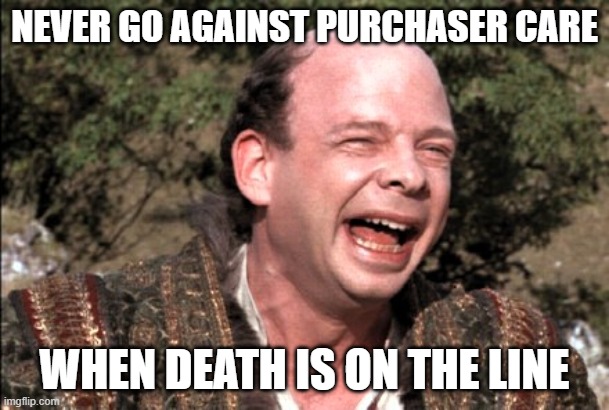Court Dismisses Trademark Claims Over Internal Search Results–Las Vegas Skydiving v. Groupon
 Las Vegas Skydiving Adventures offers tandem skydiving under the “Fyrosity” brand. It has never offered its services through Groupon. A search for “skydive Fyrosity” at Groupon says “No matching deals. You may also like ….” and produces search results for competitive skydiving vendors. (See the screenshot on the right, which I took on March 1 from my Santa Clara office). LVSA sued Groupon for trademark infringement. The court grants summary judgment to Groupon, applying the expedited confusion analysis from Multi-Time Machine v. Amazon.
Las Vegas Skydiving Adventures offers tandem skydiving under the “Fyrosity” brand. It has never offered its services through Groupon. A search for “skydive Fyrosity” at Groupon says “No matching deals. You may also like ….” and produces search results for competitive skydiving vendors. (See the screenshot on the right, which I took on March 1 from my Santa Clara office). LVSA sued Groupon for trademark infringement. The court grants summary judgment to Groupon, applying the expedited confusion analysis from Multi-Time Machine v. Amazon.
Purchaser Care. Skydiving is expensive. More importantly, “skydiving service is uniquely dangerous. Because potential skydivers entrust their lives to the service provider, the service is ‘sophisticated’ in a way that the goods (watches) in Multi Time were not. Thus, a consumer is likely to exercise more caution in selecting a skydiving provider.”
Search Results Page Appearance. “each result on Groupon’s page was clearly labeled with the service provider’s name.” The fact that “its Fyrosity mark appears multiple times on the results webpage” is no different than the MTM case.
Actual Confusion. LVSA alleged no credible evidence.
The court summarizes:
The record may demonstrate that, on a regular basis…, prospective customers try to bargain with LVSA based on pricing found on Groupon. The record may likewise show that consumers sometimes mistakenly seek to redeem vouchers for other skydiving companies with LVSA….as a matter of law, a reasonably prudent consumer in this marketplace is unlikely to be confused as to the origin of the service offered.
Case citation: Las Vegas Skydiving Adventures LLC v. Groupon, Inc., 2022 WL 594833 (D. Nev. Feb. 28, 2022). Personnel note: LVSA’s attorney was Steve Gibson, who you might remember from his failures at Righthaven.
BONUS: Melwani v. Amazon.com, Inc., 2022 WL 670919 (W.D. Wash. March 7, 2022). Melwani sells products under the “Royal Silk” brand. Melwani complains that searches for “Royal Silk” on Amazon’s internal search tool produce search results pages that include items for third-party sellers and Amazon itself. For example, according to the complaint:
On August 19, 2020, Plaintiff searched for “Royal Silk” under all departments on Amazon.com, yielding 60 product listings, including “Sponsored” product listings—ads paid for by the seller. Of these sixty listings, 17 were for official Royal Silk products, 40 listings were totally unrelated to the query Royal Silk—of these 40, 8 were paid sponsored ads for sellers who purchased the keywords “Royal Silk” and 32 were for third party sellers who Plaintiff alleges “likely” purchased this keyword—the remaining 3 were third party infringers, unlawfully using or showing the words “Royal Silk” in their product listings.
Absent from this August 19, 2020, search was any mention of the Royal Silk Store or any product listings for Royal Silk pocket squares or handkerchiefs, of which there are allegedly over 200 product listings.
Melwani sued Amazon for trademark infringement, dilution, and more. With respect to the trademark claim, the court says the Ninth Circuit’s Multi-Time Machine v. Amazon case is “directly on point and forecloses Plaintiff’s ability to bring this claim as a matter of law.” The false designation of origin claim is similarly governed by the Ninth Circuit’s Lasoff v. Amazon ruling.
More Posts About Keyword Advertising
* Georgia Supreme Court Blesses Google’s Keyword Ad Sales–Edible IP v. Google
* Competitive Keyword Advertising Claim Fails–Reflex Media v. Luxy
* Think Keyword Metatags Are Dead? They Are (Except in Court)–Reflex v. Luxy
* Fifth Circuit Says Keyword Ads Could Contribute to Initial Interest Confusion (UGH)–Adler v. McNeil
* Google’s Search Disambiguation Doesn’t Create Initial Interest Confusion–Aliign v. lululemon
* Ohio Bans Competitive Keyword Advertising by Lawyers
* Want to Engage in Anti-Competitive Trademark Bullying? Second Circuit Says: Great, Have a Nice Day!–1-800 Contacts v. FTC
* Selling Keyword Ads Isn’t Theft or Conversion–Edible IP v. Google
* Competitive Keyword Advertising Still Isn’t Trademark Infringement, Unless…. –Adler v. Reyes & Adler v. McNeil
* Three Keyword Advertising Decisions in a Week, and the Trademark Owners Lost Them All
* Competitor Gets Pyrrhic Victory in False Advertising Suit Over Search Ads–Harbor Breeze v. Newport Fishing
* IP/Internet/Antitrust Professor Amicus Brief in 1-800 Contacts v. FTC
* New Jersey Attorney Ethics Opinion Blesses Competitive Keyword Advertising (…or Does It?)
* Another Competitive Keyword Advertising Lawsuit Fails–Dr. Greenberg v. Perfect Body Image
* The Florida Bar Regulates, But Doesn’t Ban, Competitive Keyword Ads
* Rounding Up Three Recent Keyword Advertising Cases–Comphy v. Amazon & More
* Do Adjacent Organic Search Results Constitute Trademark Infringement? Of Course Not…But…–America CAN! v. CDF
* The Ongoing Saga of the Florida Bar’s Angst About Competitive Keyword Advertising
* Your Periodic Reminder That Keyword Ad Lawsuits Are Stupid–Passport Health v. Avance
* Restricting Competitive Keyword Ads Is Anti-Competitive–FTC v. 1-800 Contacts
* Another Failed Trademark Suit Over Competitive Keyword Advertising–JIVE v. Wine Racks America
* Negative Keywords Help Defeat Preliminary Injunction–DealDash v. ContextLogic
* The Florida Bar and Competitive Keyword Advertising: A Tragicomedy (in 3 Parts)
* Another Court Says Competitive Keyword Advertising Doesn’t Cause Confusion
* Competitive Keyword Advertising Doesn’t Show Bad Intent–ONEpul v. BagSpot
* Brief Roundup of Three Keyword Advertising Lawsuit Developments
* Interesting Tidbits From FTC’s Antitrust Win Against 1-800 Contacts’ Keyword Ad Restrictions
* 1-800 Contacts Charges Higher Prices Than Its Online Competitors, But They Are OK With That–FTC v. 1-800 Contacts
* FTC Explains Why It Thinks 1-800 Contacts’ Keyword Ad Settlements Were Anti-Competitive–FTC v. 1-800 Contacts
* Amazon Defeats Lawsuit Over Its Keyword Ad Purchases–Lasoff v. Amazon
* More Evidence Why Keyword Advertising Litigation Is Waning
* Court Dumps Crappy Trademark & Keyword Ad Case–ONEPul v. BagSpot
* AdWords Buys Using Geographic Terms Support Personal Jurisdiction–Rilley v. MoneyMutual
* FTC Sues 1-800 Contacts For Restricting Competitive Keyword Advertising
* Competitive Keyword Advertising Lawsuit Will Go To A Jury–Edible Arrangements v. Provide Commerce
* Texas Ethics Opinion Approves Competitive Keyword Ads By Lawyers
* Court Beats Down Another Competitive Keyword Advertising Lawsuit–Beast Sports v. BPI
* Another Murky Opinion on Lawyers Buying Keyword Ads on Other Lawyers’ Names–In re Naert
* Keyword Ad Lawsuit Isn’t Covered By California’s Anti-SLAPP Law
* Confusion From Competitive Keyword Advertising? Fuhgeddaboudit
* Competitive Keyword Advertising Permitted As Nominative Use–ElitePay Global v. CardPaymentOptions
* Google And Yahoo Defeat Last Remaining Lawsuit Over Competitive Keyword Advertising
* Mixed Ruling in Competitive Keyword Advertising Case–Goldline v. Regal
* Another Competitive Keyword Advertising Lawsuit Fails–Infogroup v. DatabaseLLC
* Damages from Competitive Keyword Advertising Are “Vanishingly Small”
* More Defendants Win Keyword Advertising Lawsuits
* Another Keyword Advertising Lawsuit Fails Badly
* Duplicitous Competitive Keyword Advertising Lawsuits–Fareportal v. LBF (& Vice-Versa)
* Trademark Owners Just Can’t Win Keyword Advertising Cases–EarthCam v. OxBlue
* Want To Know Amazon’s Confidential Settlement Terms For A Keyword Advertising Lawsuit? Merry Christmas!
* Florida Allows Competitive Keyword Advertising By Lawyers
* Another Keyword Advertising Lawsuit Unceremoniously Dismissed–Infostream v. Avid
* Another Keyword Advertising Lawsuit Fails–Allied Interstate v. Kimmel & Silverman
* More Evidence That Competitive Keyword Advertising Benefits Trademark Owners
* Suing Over Keyword Advertising Is A Bad Business Decision For Trademark Owners
* Florida Proposes to Ban Competitive Keyword Advertising by Lawyers
* More Confirmation That Google Has Won the AdWords Trademark Battles Worldwide
* Google’s Search Suggestions Don’t Violate Wisconsin Publicity Rights Law
* Amazon’s Merchandising of Its Search Results Doesn’t Violate Trademark Law
* Buying Keyword Ads on People’s Names Doesn’t Violate Their Publicity Rights
* With Its Australian Court Victory, Google Moves Closer to Legitimizing Keyword Advertising Globally
* Yet Another Ruling That Competitive Keyword Ad Lawsuits Are Stupid–Louisiana Pacific v. James Hardie
* Another Google AdWords Advertiser Defeats Trademark Infringement Lawsuit
* With Rosetta Stone Settlement, Google Gets Closer to Legitimizing Billions of AdWords Revenue
* Google Defeats Trademark Challenge to Its AdWords Service
* Newly Released Consumer Survey Indicates that Legal Concerns About Competitive Keyword Advertising Are Overblown

